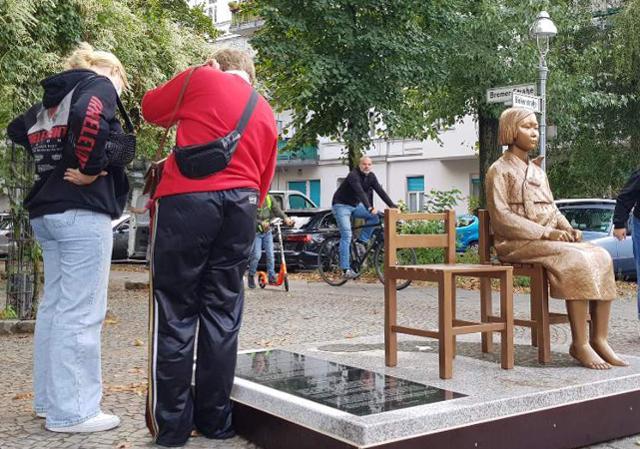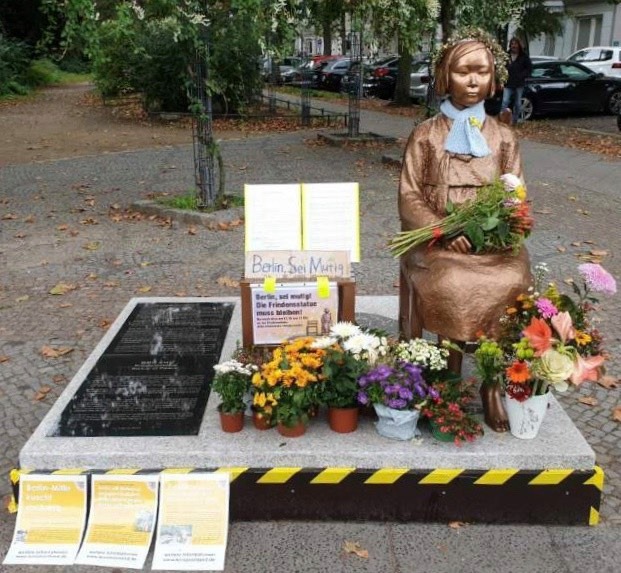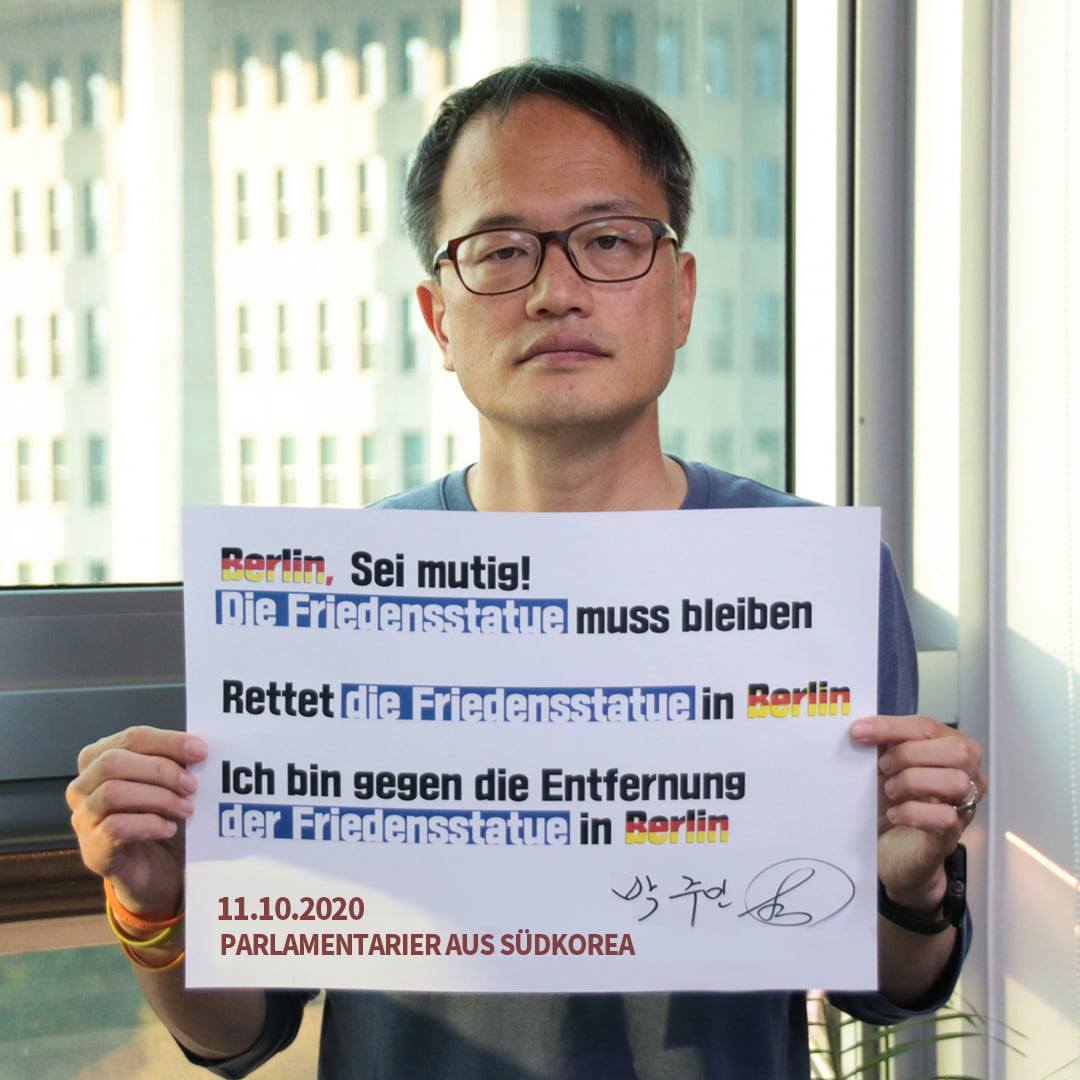Koreans protest Berlin district's order to remove 'statue of peace'
By Ock Hyun-juPublished : Oct. 12, 2020 - 17:39

A legal battle to protect a statue erected in the German capital commemorating the victims of Japan’s wartime sexual slavery began on Monday as Koreans based in Germany sought to invalidate a Berlin district office’s order to remove the statue.
Korea Verband, a Germany-based civic organization with Korean ties, were set to file for an injunction in protest against the central Mitte district’s order to remove the statue, which was installed late last month with the city authorities’ approval.
Funded by the Korean Council for Justice and Remembrance for the Issues of Military Sexual Slavery by Japan, Korea Verband set up the statue, formally called the Statue of Peace, in a busy area of Berlin’s Mitte district near the Japanese Embassy to raise awareness about wartime sexual enslavement.
It was the third such statue installed in Germany and the first to stand in a public space.
However, the Mitte district, which had initially permitted the installation for a year, ordered the removal of the statue by Oct. 14 after Japan expressed discomfort about it.
The district office threatened to forcibly remove the statue if the order is not followed by the deadline.
Koreans in Germany expressed regret over the Berlin district office’s decision.
“The issue of ‘comfort women’ should be seen in a bigger framework to root out sexual violence around the world, not just as an issue of conflicts between Korea and Japan,” said Jung Sunkyoung, a Korean who has lived in Germany for more than 20 years and who was closely involved in having the statue placed there.
Jung told The Korea Herald that stopping by the statue, paying tribute to the victims and laying flowers on it were acts of solidarity through which to remember past wrongdoings, overcome them and move on for a better future.
Korea Verband, a Germany-based civic organization with Korean ties, were set to file for an injunction in protest against the central Mitte district’s order to remove the statue, which was installed late last month with the city authorities’ approval.
Funded by the Korean Council for Justice and Remembrance for the Issues of Military Sexual Slavery by Japan, Korea Verband set up the statue, formally called the Statue of Peace, in a busy area of Berlin’s Mitte district near the Japanese Embassy to raise awareness about wartime sexual enslavement.
It was the third such statue installed in Germany and the first to stand in a public space.
However, the Mitte district, which had initially permitted the installation for a year, ordered the removal of the statue by Oct. 14 after Japan expressed discomfort about it.
The district office threatened to forcibly remove the statue if the order is not followed by the deadline.
Koreans in Germany expressed regret over the Berlin district office’s decision.
“The issue of ‘comfort women’ should be seen in a bigger framework to root out sexual violence around the world, not just as an issue of conflicts between Korea and Japan,” said Jung Sunkyoung, a Korean who has lived in Germany for more than 20 years and who was closely involved in having the statue placed there.
Jung told The Korea Herald that stopping by the statue, paying tribute to the victims and laying flowers on it were acts of solidarity through which to remember past wrongdoings, overcome them and move on for a better future.

“It was particularly disappointing, considering that Germany, a strong advocate for admitting and atoning for past wrongdoings, was prioritizing relations with Japan over their dedication to a culture of remembrance,” she said.
Former German Chancellor Gerhard Schröder and his Korean wife on Sunday sent an open letter to Stephan von Dassel, mayor of the central Mitte district, denouncing the district office’s decision as “anti-historical” and turning a blind eye to the victims of brutal violence.
Korean residents and activists in Germany were collecting signatures for a petition against the removal order at www.petitionen.com, with a plan to send it to Berlin’s Mitte district office Tuesday. The petition gathered more than 2,500 signatures as of Morning. A rally was also planned near the statue Tuesday, according to activists based in Berlin.
In Korea, an online petition was registered on the presidential office Cheong Wa Dae’s website, with the process underway for it to be approved and officially uploaded. It has already gained nearly 6,900 signatures as of Monday morning.

Some Korean lawmakers also joined the campaign through social media.
“We should protect the girl statue,” Rep. Park Ju-min of the ruling Democratic Party of Korea said on Facebook on Sunday with a picture of himself holding a placard asking Berlin to be “be brave” and keep the statue intact. He asked others to join him in signing the petition as well.
Expressing regret over the installation of the statue, Japanese Foreign Minister Toshimitsu Motegi requested it be removed during his talks with his German counterpart, Heiko Maas.
This led the Mitte district’s mayor to rescinded the approval for the statue, with him saying in a statement that permission had been given to display the statue as a broad “statement against sexualized violence against women in armed conflicts.”
But the statute “exclusively addresses the behavior of the Japanese army in World War II,” and “this has led to irritation in Japan on a national and local level and also in Berlin,” he added.
Seoul criticized Tokyo’s call for the removal of the statue, saying it went against the spirit of its own apology. However, the government appeared to distance itself from the installation of the statue, calling it “a voluntary move by the private sector.”
“It is not desirable for the government to get diplomatically involved,” ministry spokesperson Kim In-chul said in a press briefing when asked about the statue last week.
The issue of Japan’s wartime sexual enslavement of Koreans has long been a source of tension in the already frayed relations between Seoul and Tokyo rooted in disputes over 1910-45 Japan’s colonization of Korea.
Historians estimate that up to 200,000 girls and women, mostly from Korea, were recruited and coerced into sex slavery for Japanese troops before and during World War II.
To settle the issue, Korea and Japan signed a deal in 2015 in which Japan apologized to the victims and provided 1 billion yen for a Korea-run foundation, but the Moon Jae-in administration concluded the deal as flawed amid strong resistance from some of the victims and their supporters.
The bilateral ties have been further strained since Korea’s top court in 2018 ordered Japanese firms to compensate Korean victims forced into labor during Japan’s colonial rule. Japan argues the issue had been settled under the 1965 treaty normalizing bilateral ties.
By Ock Hyun-ju (laeticia.ock@heraldcorp.com)
-
Articles by Ock Hyun-ju








![[Graphic News] More Koreans say they plan long-distance trips this year](http://res.heraldm.com/phpwas/restmb_idxmake.php?idx=644&simg=/content/image/2024/04/17/20240417050828_0.gif&u=)
![[KH Explains] Hyundai's full hybrid edge to pay off amid slow transition to pure EVs](http://res.heraldm.com/phpwas/restmb_idxmake.php?idx=644&simg=/content/image/2024/04/18/20240418050645_0.jpg&u=20240419100350)






![[From the Scene] Monks, Buddhists hail return of remains of Buddhas](http://res.heraldm.com/phpwas/restmb_idxmake.php?idx=652&simg=/content/image/2024/04/19/20240419050617_0.jpg&u=20240419175937)

![[KH Explains] Hyundai's full hybrid edge to pay off amid slow transition to pure EVs](http://res.heraldm.com/phpwas/restmb_idxmake.php?idx=652&simg=/content/image/2024/04/18/20240418050645_0.jpg&u=20240419100350)

![[Today’s K-pop] Illit drops debut single remix](http://res.heraldm.com/phpwas/restmb_idxmake.php?idx=642&simg=/content/image/2024/04/19/20240419050612_0.jpg&u=)